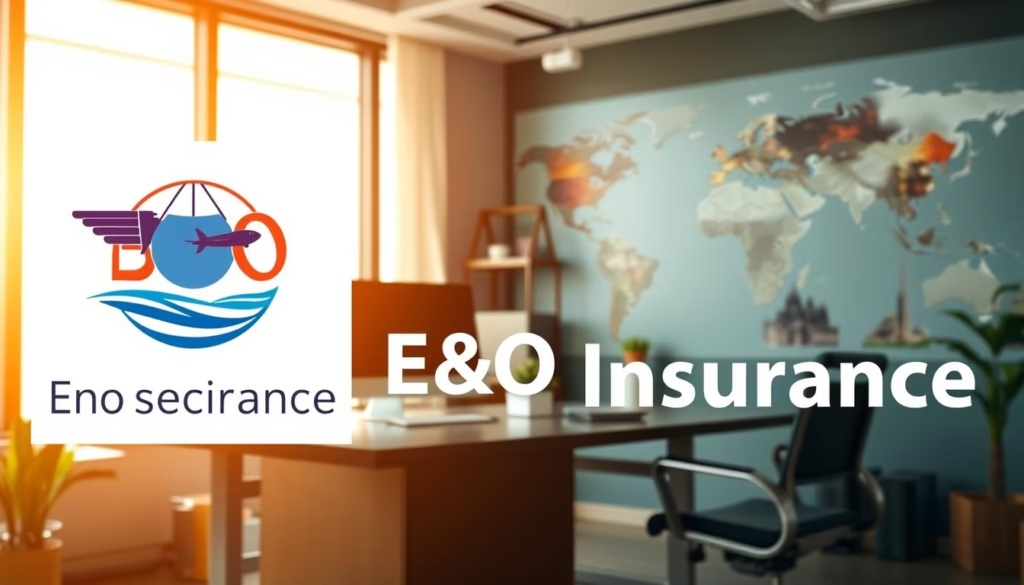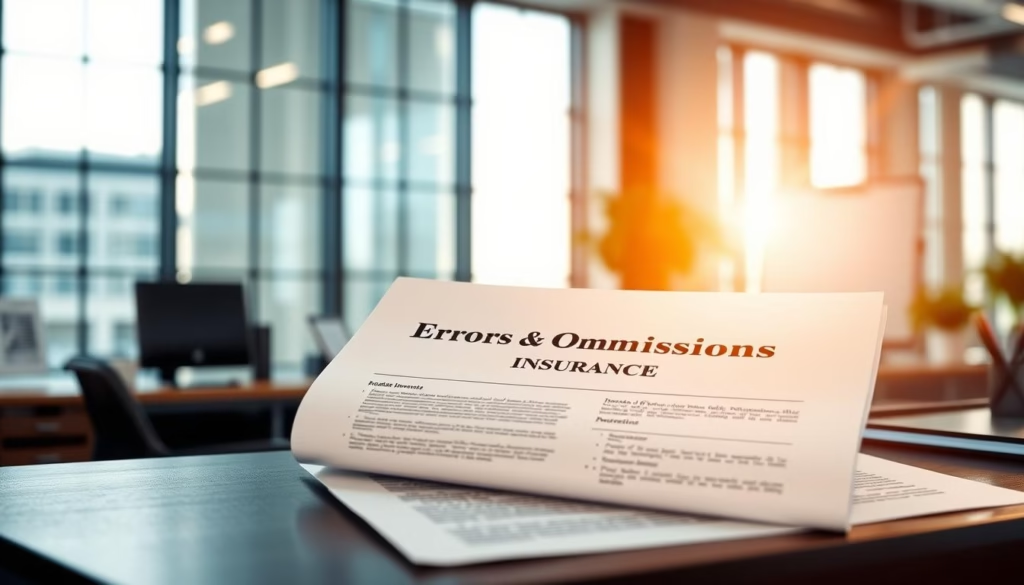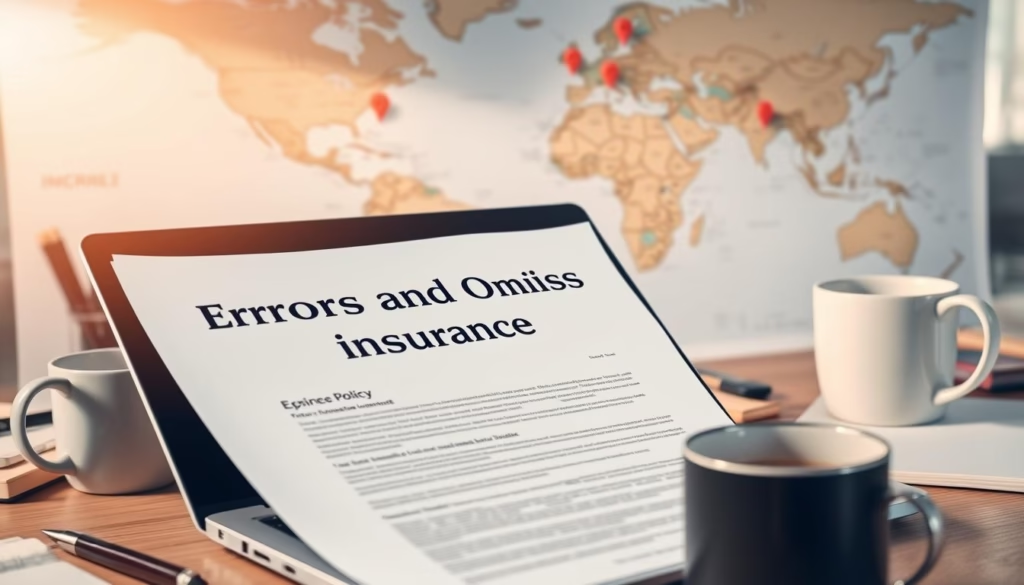Could a single client claim topple your agency’s finances or reputation?
Professional liability designed for the travel agency business protects advisors and firms when a planning mistake leads to a dispute. This type of coverage focuses on alleged faults in service, not on slips or property losses.
Many suits lack merit, yet defense fees add up fast. That makes having the right policy a practical safety net for small firms and larger hosts alike.
Policies differ by wording and insurer. Some reputable insurance providers offer travel-focused options that match industry risks. Pricing often ties to total sales, while trade groups may secure better rates for members.
Next, we will explain what this protection covers, who it shields, typical cost drivers, and how to obtain a policy quickly online—so you can decide what fits your business.
Key Takeaways
- Protect Your Travel Agency with Professional Liability Coverage
- What Is Errors and Omissions Insurance for Travel Agents?
- errors and omissions insurance travel agent: What’s Covered and What Isn’t
- Who Is Covered Under Your Agency E&O Policy?
- E&O Insurance Cost for Travel Agencies
- How to Get a Quote and Buy Coverage Online
- Conclusion
- FAQ
- This professional liability safeguard helps pay defense costs when planning advice is challenged.
- Coverage targets alleged service mistakes, not general accidents.
- Policy terms vary widely—read wording closely before buying.
- Known carriers and brokers offer travel-focused plans to match industry needs.
- Costs often depend on agency sales, history, and membership discounts; see typical pricing guides at business insurance cost resources.
Protect Your Travel Agency with Professional Liability Coverage
When a client disputes your guidance, legal bills can pile up before any fault is proven. Professional liability shields your agency from the financial shock of defending advisory work.
E&O insurance helps pay for legal defense if your firm faces a lawsuit tied to an alleged mistake. Many claims lack merit, yet defense costs mount quickly. That makes this coverage one of the most practical safeguards for growth-minded agencies.

Key benefits include preserved cash flow, protection of reputation, and predictable risk management for owners and managers. Maintaining proper insurance coverage can also set you apart with suppliers and discerning clients.
- Funds legal defense and related fees.
- Targets alleged professional mistakes rather than general liability exposures.
- Offers peace of mind so your team can focus on bookings and service.
Review defense provisions, limits, and deductibles carefully. For guidance on presenting proof of coverage to hosts or partners, see proof of coverage guidance.
What Is Errors and Omissions Insurance for Travel Agents?
A disputed booking or fee can lead to a formal claim that demands immediate legal response.
Professional liability explained:
errors omissions insurance is a policy designed to protect advisors and small firms when a client alleges a planning mistake or omission in professional service. This coverage often pays legal defense costs up to the limit and may cover settlements or judgments subject to terms.
Who it helps
- Independent advisors who charge consulting fees.
- Small agencies that create itineraries or handle bookings.
- Employees and owners who give advice for a fee.
How a policy responds
An e&o insurance policy typically defends covered claims, investigates allegations, and—if applicable—pays settlements within limits. Exclusions for intentional acts or criminal conduct are common. Read duties such as prompt reporting and cooperation carefully to preserve coverage.
| Feature | What it means | Why it matters |
|---|---|---|
| Defense costs | Legal fees paid up to the limit | Protects cash flow while claims are resolved |
| Settlement/judgment | Amounts paid if claim covered | Limits financial exposure for firms |
| Policy wording | Insurer terms, endorsements, deductibles | Determines what the cover type includes |

errors and omissions insurance travel agent: What’s Covered and What Isn’t
Professional claims often hinge on advice that missed a key detail, not on obvious negligence.
Core coverage focuses on booking mistakes, missing itinerary notes, and the legal defense fees when a client sues over advisory work. Typical e&o insurance will pay for counsel, investigation, and settlements up to policy limits when the claim falls within the contract wording.
Common exclusions
Standard exclusions deny claims for moral hazard, deliberate or criminal acts, and general premises incidents like slip-and-fall. Moral hazard means a loss that unfairly benefits the client or advisor—such as a fare underquote that helps the traveler.
Optional add‑ons
Some forms offer endorsements for bodily injury, property damage, or host liquor liability. Availability and limits vary, so verify whether these add-ons require separate endorsements or apply automatically.
| What the policy covers | Typical limits | Notes |
|---|---|---|
| Booking errors, missed visa advice | Defense + settlement up to limit | May cover financial loss from professional advice |
| Intentional wrongdoing | Excluded | Criminal acts are not covered |
| Premises liability (slip/fall) | Not usually covered | Requires separate liability insurance |
| Optional bodily injury/property damage | Endorsement-based limits | Check whether included or needs endorsement |

Review deductibles, sublimits, and whether defense is inside or outside limits. For more on commercial liability options, see our business liability resources.
Who Is Covered Under Your Agency E&O Policy?
Deciding who a policy will protect starts with how the coverage is written.
Coverage may be issued to an individual advisor, the business entity, or both. That wording controls who a claim can name and which losses the insurer will respond to.
Employees and independent contractors are not automatically covered. Some policies list staff and ICs by name. Others require separate endorsements or a different form.
Individuals, entities, employees, and independent contractors
Confirm whether the policy includes your employee roster or contract worker list. Ask for explicit language that names those parties.
Using a host agency’s policy: key questions and booking limitations
“Always request the policy certificate and full wording before relying on a host policy.”
When you use a host policy, verify deductible, per-claim and aggregate limits, and whether independent contractors are covered. Bookings made outside the host’s accreditation number usually fall outside coverage.
| Item | What to check | Why it matters |
|---|---|---|
| Named insured | Individual or company listed | Determines who is defended |
| Limits | Per-claim and aggregate amounts | Shared limits can be exhausted by others |
| Accreditation tie | Bookings linked to host number | Outside bookings may be uninsured |
Tip: Keep booking records that show which entity placed each reservation. Align coverage with your model—solo advisor, multi-advisor firm, or agencies with staff—to avoid gaps.
E&O Insurance Cost for Travel Agencies
Premiums vary widely, so knowing what drives cost helps agencies budget smartly.
Primary pricing drivers
Total sales volume is the main factor underwriters use to set premium bands.
Other rating items include staff count, services offered, prior claims, chosen limits, and deductible level. A higher limit or lower deductible raises cost. A clean claim history and tight controls lower it.
Ways to reduce premiums
- Select limits and deductibles that match your risk tolerance to balance protection and price.
- Seek preferred terms through consortia, host networks, or trade associations.
- Document client disclosures, waivers, and QA checklists to support favorable underwriting.
| Driver | How it affects premium | Underwriting tip |
|---|---|---|
| Total sales | Higher sales = higher base premium | Split revenue bands when possible; review annually |
| Staff size & services | More staff or complex itineraries increase risk | Train staff; limit high‑risk offerings |
| Limits & deductibles | Higher limits raise cost; higher deductible lowers it | Align limits with contracts and partners |
| Claims history | Prior losses drive surcharges | Improve controls; disclose promptly |
Tip: Compare quotes and review policy wording, not just premium. For practical guidance on coverage options, see E&O for travel agencies.
How to Get a Quote and Buy Coverage Online
A short online application often unlocks multiple quotes within minutes.
Easy three-step flow
Complete an application: Give basic business facts like annual revenue, staff count, and desired policy limits.
Compare quotes: Review price, exclusions, defense cost handling, retroactive dates, and endorsements that fit your agency.
Buy and download: Pay online and receive a certificate immediately to meet host or accreditation rules.
Pick the right provider
Work with insurance providers that know agency risks and can place coverage with top U.S. carriers. Licensed brokers often tailor policies for independent advisors or firms with staff.
What you’ll need
- Annual revenue and number of employees.
- Desired limits, deductible, and prior claims history.
- Names to add as additional insureds or certificate holders.
Tip: Compare more than price. Check exclusions, defense provisions, and whether you need general liability or commercial property cover to complete your risk program.
Conclusion
A well‑chosen policy prevents a single dispute from derailing business growth.
E&O for travel professionals funds legal defense and, when covered, settlements for alleged missteps tied to advisory work. Individual advisors, multi‑advisor firms, and travel agency entities benefit when the named insured is clear.
Review what the policy covers, note exclusions, and set limits, deductibles, and endorsements that match your business model. Use checklists, client confirmations, and clear disclosures to reduce risk and support defense if a claim arises.
Compare options with an experienced insurance agent, confirm wording before you bind, and budget for this protection as part of normal operating costs. For more on wording and buying tips, see errors and omissions details.
FAQ
What is professional liability coverage for travel agencies?
Professional liability coverage protects agencies and advisors from claims alleging negligent planning, incorrect information, or missed bookings. It typically pays for legal defense and settlements when a client alleges financial harm due to an advisor’s advice or actions.
Who should carry an agency E&O policy?
Independent advisors, retail agencies, host agencies, and agencies that charge planning or consulting fees should consider a policy. Coverage often extends to employees and approved independent contractors listed on the policy.
What common situations does a standard policy cover?
Core protections include mistakes in bookings, miscommunications about itineraries, missed connections caused by negligent planning, and claims of inadequate advice. Most policies respond to allegations and the resulting legal costs.
What typical exclusions should agencies expect?
Policies usually exclude intentional criminal acts, fraud, punitive damages, and general premises liability like slip-and-fall incidents. Damage to client property and bodily injury are often excluded unless added as endorsements.
Can I add coverage for bodily injury or property damage?
Yes. Many insurers offer optional add‑ons or endorsements for bodily injury, property damage, and host liquor liability. These are policy-specific and increase overall protection for in-person events or escorted tours.
Does a host agency’s policy cover me when I book under their umbrella?
A host policy may provide some protection, but you must verify limits, covered activities, and any booking restrictions. Ask whether your bookings, subcontractors, and fee-based services are explicitly included.
What factors affect the cost of coverage?
Premiums depend on annual sales, number of employees, services offered, past claims history, chosen limits, and deductible size. Agencies that sell high-risk products or large-value trips typically pay more.
How can agencies reduce their premium?
Lower limits, higher deductibles, membership in a consortium, or preferred programs through host agencies and industry associations can reduce cost. Maintaining a clean claims record and following documented procedures also helps.
What is the typical process to get a quote online?
Complete a short application with revenue, employee count, services, desired limits, and claims history. Compare quotes from providers specializing in agency coverage, select terms, pay, and download your certificate of insurance.
Which providers specialize in policies for travel professionals?
Look for insurers and brokers with experience serving agencies and advisors, such as Global Rescue partners, HIG, or other firms focused on travel industry risks. Experience with agency workflows and common claim scenarios is essential.
What information will I need to bind a policy?
Insurers usually request annual gross sales, number of staff, a description of services, desired limits and deductible, and any prior claim details. Some underwriters also ask for client contracts and sample booking terms.
How does a claim typically proceed under a professional liability policy?
Once a claim is reported, the insurer assigns a claims adjuster or defense counsel, evaluates coverage, and pays for defense costs and settlements up to the policy limit. Prompt reporting and cooperation improve claim outcomes.